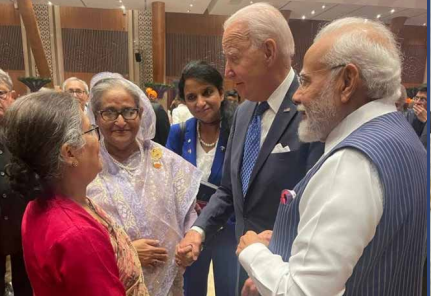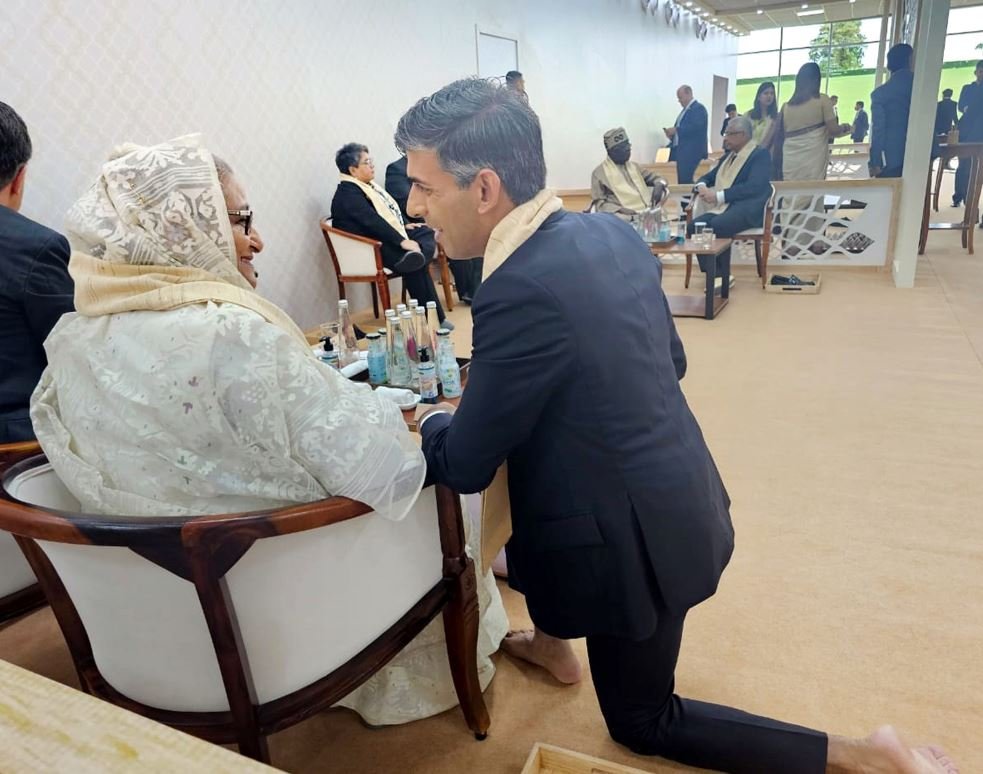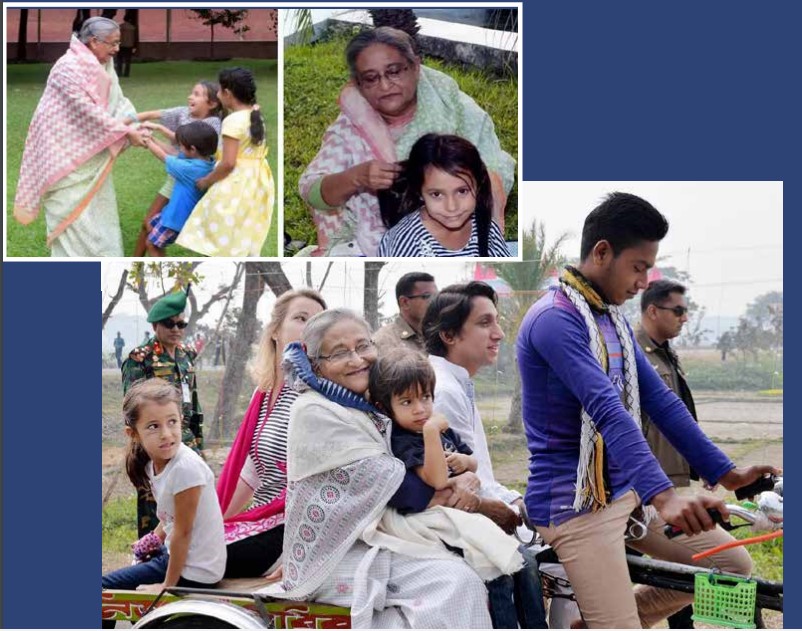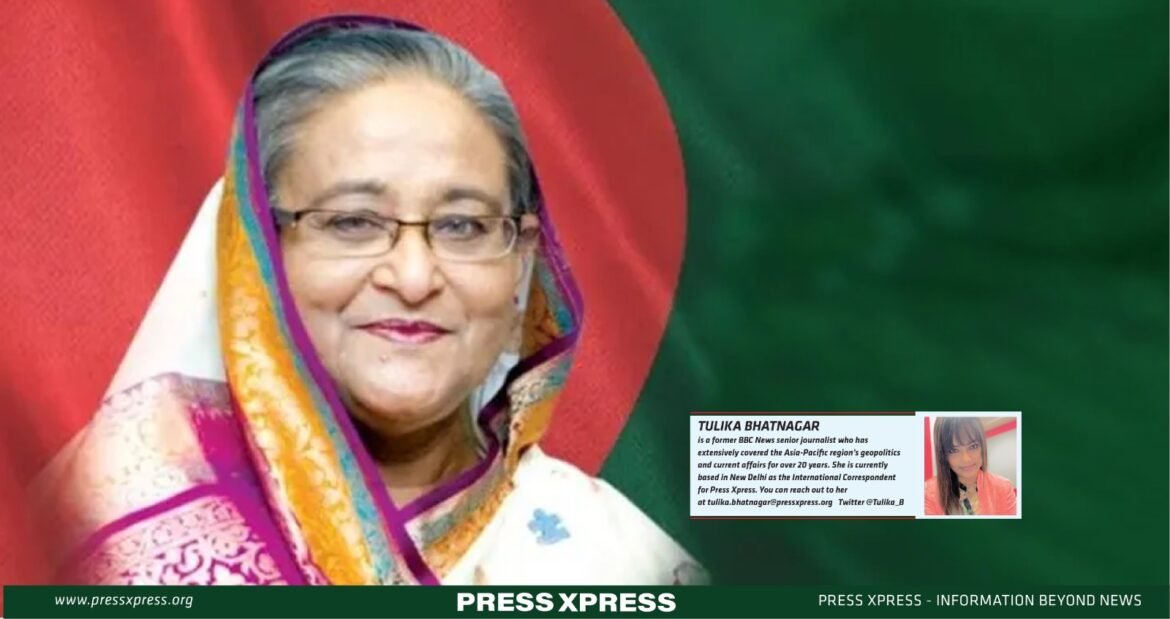She is a symbol of perfection to many. To many others, she is the belief that when it comes to achieving diversity in politics or business, it’s not just about getting women there but keeping them.
Sheikh Hasina Wajed, prime minister of Bangladesh, is the kind of political leader that the world wants to endure because they are the kind that builds new narratives.
In the last 13 years, Hasina has emerged as a powerful global woman leader who has shown the world that countries can be run not only with force and ferocity but with compassion as well as empathy.
You can also read: India State Polls: The Rise and Rise of PM Modi
When she became the prime minister of the country in 2009 for a second time after 1996, it was with a sweeping win – and high hopes that the poverty-wracked country of over 150 million at that time, would be put on a clear path of growth.
Her government turned the tide.
The poverty rate in Bangladesh reduced from 41.5% in 2006 to over 18% in 2022, while extreme poverty has gone from over 25% to almost 5%.
In fact, during two decades in office, Hasina has presided over a momentous annual GDP growth of 7% for much of the time.
Recent data from the International Monetary Fund (IMF) also shows that Bangladesh continues to have a higher per capita GDP than India till 2022, and did not face economic contraction even during Covid-19.
Read more: https://www.imf.org/external/datamapper/NGDPDPC@WEO/IND/BGD

An unconventional leader
Politics remains a rough playing field for women around the world.
Even though Hasina led her party, the Awami League, to victory in three consecutive elections, Bangladesh’s female prime minister has had to endure a barrage of accusations about authoritarianism and corruption.
Her decision to fight these accusations head-on with facts and data has silenced many on the global platform.
For example, the World Bank, which canceled a $1.2 billion loan for the construction of Padma Bridge over accusations of corruption, later conceded to the unverified allegations. In a telling conclusion to the controversy, PM Hasina even presented a picture of the completed 6.15 km bridge – the longest in South Asia and self-financed by the country – to the World Bank president David Malpass earlier this year.
Turning the tables around, she also signed a deal of 2.5 billion dollars between Bangladesh and the World Bank to implement five projects.
Her infamous economic model also called “Hasinomics” is a development miracle to many developing countries, including Pakistan.
Bangladesh’s GDP, after liberation from Pakistan in 1971, was barely $8 billion. Pakistan’s was around $11 billion at that time. Today, Bangladesh boasts of a $446 billion economy, while Pakistan’s GDP is at $340 billion.
From being one of the poorest nations at birth in 1971, Bangladesh reached lower-middle income status in 2015. And is now on track to graduate from the UN’s Least Developed Countries (LDC) list in 2026.
Hasina’s visionary public policies have paid off.
She has also become an icon and a champion for women in public life, bringing a compassionate and authoritative energy to the mostly masculine world of politics.
Recently, US-based business magazine Forbes ranked Prime Minister Hasina as the 9th most powerful woman in the world in politics & policy in 2023. And the 46th most powerful woman in the world overall.
Forbes’ ranking – determined by the key metrics of money, media, impact, and influence – identifies powerful women for shaping policies, products, and political battles that define today’s world.
Read more here: Power Women: Sheikh Hasina Wajed, Forbes
It’s also come at a time when Bangladesh is heading toward a very crucial general election on 7 January. In the run-up to the big day, there’ve been rising instances of foreign interference, accusations of authoritarianism, and declarations by the main opposition to boycott elections over unfounded allegations of biased voting.
But Hasina has continued to emerge as a growing symbol of a hugely popular world leader who provides stability and direction to the country.

‘Iron Lady’
Sheikh Hasina is the world’s longest-serving female head of government, and one of the most significant of either sex, says Tysons Corner in the British weekly newspaper The Economist in an article titled “Sheikh Hasina is Asia’s, Iron Lady”.
American news magazine TIME also recently lavished praise on Hasina, calling her “the personification of an iron fist in a velvet glove” and crediting her with uplifting Bangladesh to rapidly become the second-largest economy of South Asia after India.
According to the World Bank Group President David Malpass, “Many countries can learn from (this) success.”
“The country stands out for its innovative approaches to reducing poverty in record time, empowering women, achieving widespread electricity access, and adapting to climate change”
Malpass noted earlier this year in May, as the World Bank marked its 50-year partnership with Bangladesh.
“Her visionary approach, unwavering commitment to social welfare, environmental custodianship, and adept diplomacy have metamorphosed Bangladesh and cherished her among the world’s most illustrious leaders”
MA Hossain
Political and defense analyst based in Bangladesh.
“She has transmuted a predominantly agricultural economy into a burgeoning industrial juggernaut – a remarkable endeavor,” Hossain writes in Modern Diplomacy.
Beacon of hope
Author Morghan Knight writes in a captivating biography of Hasina, published in 2023, that she is one of the “most remarkable leaders of our time” and a “beacon of hope” on the global stage.
Despite an early life shaped by political turmoil and adversity, she led Bangladesh to unprecedented economic growth. “Her unwavering commitment to human rights” is a matter of respect and admiration, the author argues in the book titled “The Woman Who Changed a Nation”.
Recently, human rights and free speech in Bangladesh have come under world scrutiny after the jailing of many activists and politicians.
However, her government’s compassionate response to give shelter to over 1 million Rohingya refugees forcibly displaced from Myanmar, contradicts such views.
British Prime Minister Rishi Sunak lauded PM Hasina earlier this year calling her “an inspiration”.
“I’ve been following you for many years,” he said, adding that his wife and two daughters were big fans of Hasina. Sunak praised Hasina for giving shelter to the Rohingyas and houses to the landless and homeless Bangladesh people at government expense as well as her glorious role in various international forums including climate change.

In fact, Sunak’s photo, kneeling down to talk to Hasina at the G20 Summit held in India in September 2023, went viral around the world on social media. In her signature style of an elegant saree draped over her head, spectacles, silver hair, and a smile, Hasina is seen sitting on a chair while Sunak kneels down on the floor to speak with her.
A warm and seasoned leader, Hasina, at 76 years of age is also known for her love of grandchildren, fishing, cooking, and sewing.

Her empathy is widely praised in her 15 years of service as the country’s premier, making her the world’s longest serving female head of state.
Despite making strides at home and abroad, death threats have followed Hasina throughout her premiership.
The attempts began right after the brutal murder of the Father of the Nation Bangabandhu Sheikh Mujibur Rahman in 1975 and continued with her return to home from exile a few years after her father’s assassination.
Hasina has survived nearly 28 assassination attempts.
Each time, she has come back with a more fiery resolve and fierce ambition.
“I belong to the people, I belong to the soil,” she says, choosing not to restrict her life behind bullet-proof glass – and without fail, starting every day with an early morning prayer, reciting the Quran.



